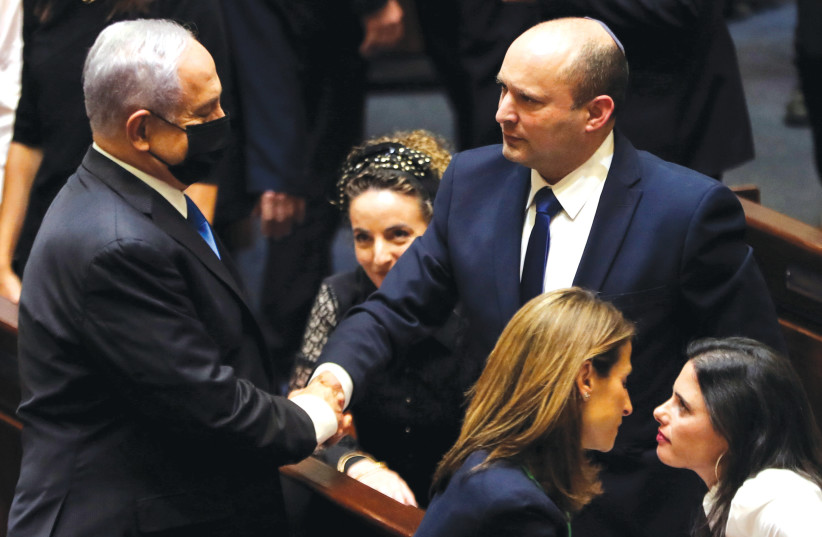In its first four months, Israel’s government can point to one truly significant achievement – combining its disparate forces to push and then keep Benjamin Netanyahu out of office. Indeed, historians will ponder how for over a decade streetwise Israelis allowed a man who consistently acted against their best interests to lead them.
The eleventh-hour government of change came to power facing scorched earth in key areas – ties with US democrats, support of liberal Jews, relations with neighboring Jordan and moves toward accommodation with the Palestinians – as well as economic profligacy, poisoned political debate, a beleaguered judiciary and a confident Iran racing toward nuclear capability after Donald Trump’s America – at Netanyahu’s insistence – withdrew from the 2015 agreement restricting Tehran’s nuclear activities.
The new government has already taken initial steps to address many of these concerns. But on the most fundamental strategic issue of all, ongoing military rule over close to three million Palestinians – a situation that manifestly threatens Israel’s continued existence as a Jewish and democratic state – Prime Minister Naftali Bennett has had little to say.
The height of this disregard came in his late September UN address, in which he pointedly ignored the elephant in the room. His reluctance to engage seems to derive from a fear that anything he says might upset either the right or the left in his coalition of opposites. But to maintain the occupation by inertia is to play with fire.
So what alternative to the do-nothing slide into inevitable conflict over Israel’s very essence could the new, ostensibly hamstrung government possibly offer? To do anything of consequence, it will have to walk a fine line between its right-wingers, including the prime minister, who categorically reject the idea of a Palestinian state as an untenable security threat and the Center-Left, including Bennett’s deputy, Yair Lapid, who argue that in the event of Palestinian statehood Israel’s sophisticated military could handle any military challenge that might or might not arise, and that, on the contrary, it is the ongoing occupation that threatens Israel’s Jewish character and its democracy in ways beyond its control.

Nothing will happen before the passage of the budget in the second week of November, affording the coalition at least two years of virtually cast-iron parliamentary immunity. Then, because doing nothing is so patently a poor option, the government of opposites could surprise with a lowest common denominator initiative.
The most likely avenue would be the announcement of plans for significant investment in both the West Bank and Gaza with international participation. This corresponds perfectly with Bennett’s notion of big spending to create a better life for the Palestinians as a cure-all. And the Center-Left could present it as a first step in a package of confidence building measures on the road to a two-state solution.
Bennett-style investment will not be enough in itself. The Palestinians are not about to waive their national aspirations for a mess of pottage. To bring them in as players in the negotiating stakes, at some point there will need to be a carefully crafted, give and take, step-by-step road map with clearly defined goals and a promise of eventual Palestinian statehood.
For the prime minister and others on the coalition’s Right, this would likely be a bridge too far. For Bennett, the hawkish former settler leader, anything that hints at Palestinian independence is anathema. For him the goal is as much territory for Israel as possible coupled with maximum security. His thinking is to buy Palestinian quiescence by raising living standards in the West Bank and Gaza.
This is what emerges from the seven point “Stability Initiative” he outlined in February 2012. In it he dismissed both the two-state solution and annexation of the West Bank to Israel as “impractical.” Instead he offered a middle of the road plan to stabilize the “fundamentally insoluble” conflict “for decades”: Israel would keep an iron grip on security, while creating conditions for a freer and better life for the Palestinians.

This was the plan: Israel would annex Area C – around 60% of the West Bank including all the Jewish settlements – and grant the 80,000 or so Palestinians living there Israeli citizenship. The two-and-three-quarter million plus Palestinians in the more densely populated and settler-free A and B areas would be granted “full autonomy,” including freedom of movement to all parts of A and B “without encountering a single IDF roadblock.” Roads, tunnels and bridges would be built to make this possible as part of massive investment in the Palestinian economy.
Besides its considerable territorial gains, Israel would retain security control over the entire area and there would be no return of refugees. The plan, Bennett argued, would keep a lid on terror, take the sting out of the occupation and win international plaudits.
This, to put it mildly, is wishful thinking. Clearly the plan as it stands is a hopeless non-starter. No Palestinian leader and few if any in the international community would condone Israel annexing over half the West Bank and leaving the Palestinians to govern themselves in a miniscule enclave under overall IDF control. On the contrary, the response would likely be chaos on the ground coupled with international outrage. The very opposite of stability.
This, however, is not the end of the story. A few years ago, there was an attempt to develop a more nuanced version of the Bennett plan. Author Micah Goodman, one of the people who has the prime minister’s ear on the Palestinian issue, produced a similar scheme – but one more generous to the Palestinians, and with a view to gaining support from right and left-wingers alike.
In his best-selling Catch 67, Goodman outlined two plans to “minimize” the “intractable” conflict: “Partial Peace” and “Divergence.” Both are intended to counter the threat ongoing occupation poses to Israel’s Jewish and democratic character, but without presuming, or even attempting, to solve the purportedly insoluble conflict.
Of the two, “Divergence” is closer to Bennett’s thinking. It has two-prongs: Territorial and diplomatic. On the territorial side, Israel cedes a sizeable part of Area C to the Palestinians to facilitate freedom of movement in the West Bank as a whole. The few Palestinians who remain on the Israeli side are offered Israeli citizenship. Huge infrastructure projects to facilitate freedom movement in the Palestinian areas are undertaken. There is, a la Bennett, massive investment in the West Bank economy. And, as in Bennett’s plan, Israel retains its security presence in the West Bank and overall control of security throughout.
On the diplomatic front, however, the plan goes much further than Bennett ever has: Israel recognizes the PLO as the State of Palestine and it cedes part of Jerusalem for its capital.
Is Bennett, as prime minister, in favorable given circumstances, likely to make the diplomatic leap his confidant suggests? Probably not.
But assuming his government does make a positive start with significant economic aid for reconstruction in Gaza and for infrastructure to promote freedom of movement in the West Bank, this could set the stage for a bolder, calibrated, step-by-step peace plan after Bennett makes way as prime minister for the centrist Lapid in August 2023.
If taken as a step towards two independent states – Israel and Palestine – the West Bank infrastructure idea is meant to create conditions for physical separation between the two, while maximizing Palestinian autonomy and gradually reducing Israel’s military presence; and the Gaza reconstruction notion is tied to hopes for eventual disarmament and, more realistically, to moves toward a long-term ceasefire or hudna.
An Israeli initiative along these lines would have broad US-led international backing. The new American administration is talking about leveraging the Abraham Accords with Gulf and North African Arab states to produce movement on the stagnant Palestinian track.
Even if, after making goodwill gestures, Israel concludes that there is no serious Palestinian partner, it would still have the option of taking unilateral steps to create a two-state reality to secure its Jewish and democratic future. For example, it could declare the security fence its new temporary border, maintain a time-bound military presence in the Jordan valley, announce a willingness to withdraw from the rest of the West Bank and invite the Palestinians to negotiate terms for final borders and all other issues when they are ready.
The point is, despite its heterogeneous make-up, the government’s hands are not tied. And failure to act will have consequences. It would almost certainly accelerate Palestinian and international pressure for one-person-one-vote in a single state with some form of shared binational government.
The growing calls for a binational solution in lieu of progress on the two-state track pose a serious threat to the fundamental Zionist notion of Jewish liberation through Jewish self-government, preferably in a sovereign Jewish state.
The binational idea is also, on the face of it, unworkable. If the enmity between the two sides is such that they cannot agree on conditions for separate existence, how would they come to terms on the far more complex issues of power-sharing in a single state? How would they agree, for example, on a joint constitution, a legal system, the control of armed forces, intelligence gathering, foreign policy, the handling of irredentist forces or the return of Palestinian refugees?
This government of opposites has managed to establish a governing modus vivendi largely by shelving tough questions. But if it is to make more than a passing mark on history it will need to find the collective courage to set in motion moves designed to rid Israel’s Jewish democracy of the corrosive incubus of occupation.
The author is The Jerusalem Report’s former diplomatic and opinion editor.
